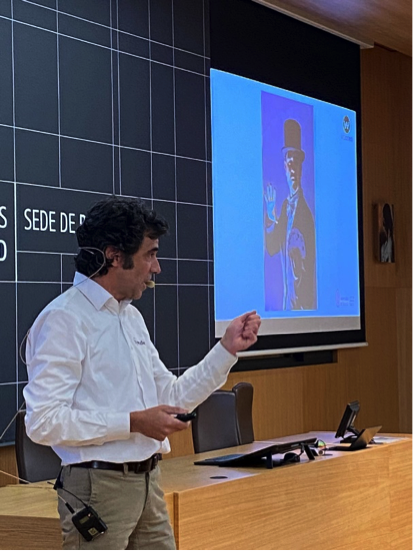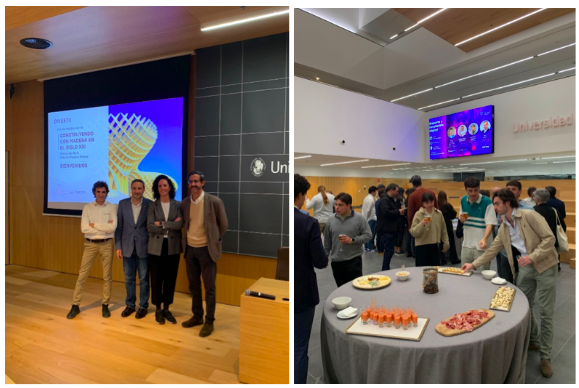"Last Tuesday, November 14, the students of the University of Navarra's Master's Degree University of Architecture (MUA) had the privilege of immersing themselves in the fascinating world of sustainable construction during the colloquium 'Building with wood in the 21st century'. This event stands as a cornerstone within the MUA colloquia that are organized throughout the course. It was coordinated by the Chair Madera ONESTA, an entity that has marked guideline in the promotion of wood as a building material and in the development of a culture that embraces sustainability.
The event gave us a panoramic view of the innovations and challenges surrounding the use of wood as a building material, with leading experts at subject. José Manuel Cabrero, director of the Chair Madera ONESTA, guided us through the history and objectives of this initiative, born in 2010 thanks to the support of the Government of Navarra. The Chair, which is currently dedicated to teaching, dissemination and research, has played a crucial role in promoting a sustainable management of forest heritage and fostering the culture of wood in construction.
Pablo Saiz, PhD in Industrialized Architecture and representative of Woodea, immersed us in the exciting world of sustainable construction. Woodea is a construction company with leave carbon footprint that advocates sustainable and affordable buildings. Its commitment focuses on systematization and digitalization in construction processes to achieve efficiency, aligning with the premise that industrialization is core topic for sustainable construction.

Digitalization in these processes, as Saiz emphasized, plays a crucial role in making the right decisions. In a world where industrialization is being redefined, wood stands as a major player, not only for its sustainability, but also for its versatility and ability to meet quality and affordability standards.
Ibán Carpintero, founding architect of BAUMAD, shared with us his valuable experience in building with wood, unraveling the reason why this material becomes the protagonist of his projects. Wood, far from being a novelty, has been an essential component in construction throughout history, although in latitudes different from Spain.
Carpintero's fascinating narratives about this building subject captured our attention. He immersed us in a world of possibilities and programs, from a stunning single-family home in the Swiss Alps, which rises majestically in that region, to a multi-family building in Valencia. These experiences eloquently demonstrated that wood adapts with versatility to different types of architectural needs.
The workshop culminated with a roundtable that explored the niche market attracted by sustainable construction. Crucial issues such as costs, building construction entirely with wood, structural stiffness without increasing the carbon footprint and the eternal discussion: wood or green concrete? In an optimized European context, the challenge in Spain is to improve systems to fully embrace the vision of a more sustainable construction.
This event not only broadened our professional horizon, but also left a deep impression on the crucial role of wood in contemporary architecture. As future architects, we recognize the importance of keeping this material in mind in our professional internship , thus contributing to a future where construction generates less environmental impact. Wood, with its sustainable qualities, stands as an essential choice for constructing more environmentally friendly and socially responsible buildings.
After the lecture, we were able to go down to the atrium of the headquarters and enjoy a cocktail with the members of Onesta and the other attendees, a good opportunity to network and chat about the possibilities of wood in architecture".

Text written by: Celia Matesanz, student of Master's Degree University in Architecture (MUA).